Hong Kong, China
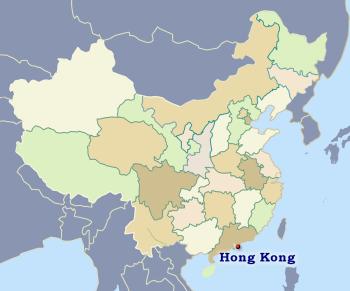
| Province | Xiāng gǎng 香港 'fragrant harbor' |
| Short name | 港 Gǎng |
| Capital | Hong Kong City |
| Population | 7.474 million (0.53%) [29th] comparison table |
| Area | 1,000 km2 [386 mile2] (0.01%) [32nd] |
| GDP | 314,187 (9.39%) [1st] |
| Neighbors | Guangdong Macau |
| Others | or just click on the map |
Hong Kong is a former British island outpost. It is a very small ‘Special Administrative Region’ rather than a province as it is working through fifty years of ‘two systems one country’ transitional period negotiated with the UK. Its quasi-independence is clear from the retention of its own currency, the Hong Kong dollar ➚ which is pegged to the US dollar, and its own flag (a five petaled flower of the orchid tree [Bauhinia x blakeana]).
The name ‘Hong Kong’ is based on the local Cantonese name for the island; the mandarin name is Xianggang meaning fragrant harbor. It is known colloquially as the Oriental Pearl and stands strategically on the Pearl River delta ➚ where vast amounts of sea trade passes to the main Chinese southern port of Guangzhou. It has steep mountains, with ‘The Peak’ (Shan teng) 1,811 feet [552 meters] rising dramatically from the sea. Much of the sea front and the airport sit on reclaimed land as there is so little flat land. The large town of Kowloon on the mainland also part of Hong Kong, means ‘nine dragons’ ( jiu long in mandarin Chinese) because it is built on nine hills. A transport link over the Pearl Estuary to Macau and Zhuhai opened in October 2018. It is currently the world's longest sea bridge and part tunnel under the busy shipping lanes.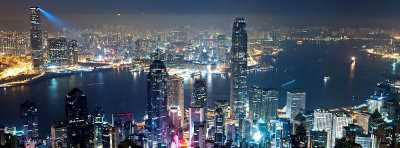
Hong Kong History
Initially the British Prime Minister Lord Palmerston ➚ dismissed Hong Kong Island as of little value: ‘a barren rock with nary [not] a house on it’. At the time Hong Kong did have a small population (15,000 by the Ming dynasty) but many lived in boats along the harbor, however it is true that there were few permanent houses. The harbor proved an excellent base for trade with China standing on the other side of the Pearl River estuary to the much older Portuguese colony of Macau. Lord Napier ➚ seems to be the first to suggest using it as a British base in 1834. This followed the successful creation of Singapore as a treaty port by Britain in 1819. Captain Elliot believed he had the Manchu envoy Qishan's agreement for the sale of Hong Kong island on 20 January 1841. Hong Kong island became a British possession in 1842 under the treaty of Nanjing at the end of the First Opium War, and in 1860 China lost neighboring Kowloon too in the Second Opium War. The first flimsy settlement was constructed and when this was swept away by a typhoon the Emperor went to a temple to give thanks. However the settlement was quickly rebuilt.
Among the first actions of the British was the establishment of law and order. The HK legislative council (LegCo ➚) was created in 1843. The Governor of Hong Kong was the ultimate power in the colony. In the early days the British ruled without any Chinese involvement. There was a flood of refugees from the Taiping rebellion who were grateful for any safe haven. Governor Sir Hercules Robinson (1859-65) was one of the first to start laying on public services: water, drains, gas and roads. The HSBC was founded on 3/3/1865 at Hong Kong. After a financial crash in 1866 the Chinese began to assist in administration. In these days it was the clearing of pirates from the Pearl Estuary and the South China Sea that was a necessary first step to opening the port. Sir John Pope Hennessy (1877-82) appointed the first Chinese person Ng Choy ➚ to LegCo. In the 1890s the colony had grown so much that land reclamation around the harbor was needed. Among the Chinese the Triad gangs remained a major problem at this time.
It was Scottish entrepreneurs such as Jardine Matheson ➚ who turned Hong Kong into a bustling port. Cantonese People moved from surrounding Guangdong province to provide an ample supply of cheap labor. Britain leased the 'New Territories' on the mainland in 1898 for 99 years and this was the reason for the handover on June 30th 1997. If only the New Territories had been returned to Chinese control, the remaining 'permanent' possession of Hong Kong Island would not have been able to function independently - for example it had no water supply.
The University of Hong Kong began as a medical school in 1887, it was here Dr. Sun Yatsen graduated in 1892. At the turn of the 20th century the city authorities stamped out the opium trade. When the Republic of China was declared in 1912 many hoped that Hong Kong would be returned to China and protests took place. Eventually the stability of British Hong Kong was considered better than the continued upheavals on the mainland. This changed after the Versailles Treaty and the early 1920s were a period of unrest over the poor work and living conditions of the citizens. Sir Cecil Clementi ➚ was governor 1925-30 and has the first fluent Chinese speaker. The Kai Tak airport was built and Clementi outlawed the ‘Mui tsai’ 妹仔 mèi zǐ system where girls were sold into virtual slavery. There has been a continued unwelcome influence of 'triads' ➚ who operate by threatening small businesses to pay protection money. Triads are named from the trinity of Earth-Man-Heaven and is believed to have had their origins among Ming loyalists to the Manchu invasion of 1644.
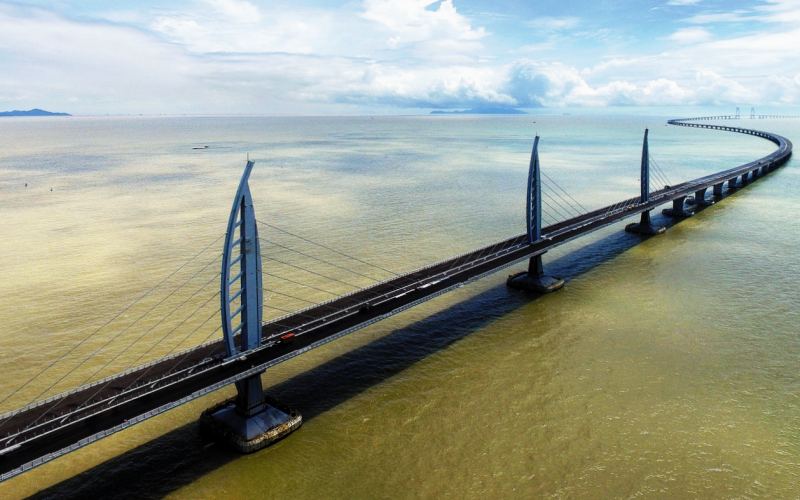
When the Japanese invaded China in 1937 Hong Kong was considered at first a safe haven and many Chinese fled there. Hong Kong served as a major supplier of clandestine arms to the Free China resistance under Chiang Kaishek. Winston Churchill in 1940 was too pre-occupied with defense in Europe to be able to offer anything but token resistance to a Japanese invasion. The invasion came 17 days after Pearl Harbor on 25th December 1941, Canadians provided the main defense (14,000 against 35,000 Japanese), there was no real defense plan and limited armament. The Japanese brutality was soon evident with the slaughter of staff and patients at a hospital. The press was taken over and food shortages began. An underground movement was founded with many Chinese viewing the British better rulers than the Japanese. During the occupation US president Franklin Roosevelt promised Hong Kong would be restored to China after the war but later disillusionment with Chiang resulted in Hong Kong being restored to Britain (who had never agreed to the restoration) after Japanese defeat in 1945.
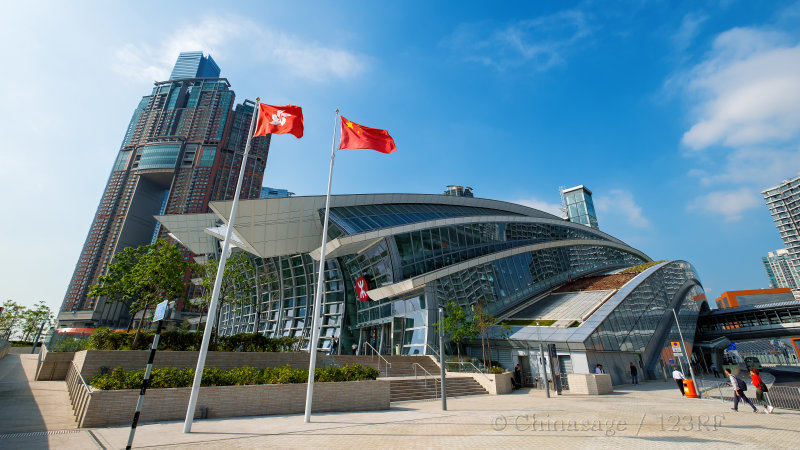
Hong Kong shot to prosperity after the Second World War when capitalists fled Communist mainland China but continued to trade (often illegally) with the mainland. The main period of growth was 1947-57 when Hong Kong moved to manufacturing rather than just import and export. Work and living conditions were poor but better than on the mainland. With the communist Great Leap Forward (1958-1960) about three million refugees came to the colony. When Mao Zedong launched the Cultural Revolution (1966-75) the capitalist and foreign-run island came under pressure. The Star Ferry strike of 4th April 1966 led to a series of strikes. A fervent communist underground movement then turned to violence and bomb attacks. On 26th August two children were killed playing with a terrorist bomb. Public sentiment turned against the movement and even the mainland government distanced itself from them. It was at this time that a feeling of Hong Kong identity grew - separate from just being Chinese.
In the period after 1967 Governor Sir Murray MacLehose answered some of the grievances by introducing free health care and welfare payments. In addition an anti-corruption operation particularly against the police helped improve confidence in the justice system. Negotiations about the hand-over of the colony began with Percy Craddock in 1979. Deng Xiaoping had given an assurance that nothing would change in Hong Kong after the transfer. The last governor Lord Patten upset the goodwill that had been carefully cultivated when he attempted to quickly install direct elections even though the agreement would allow Beijing to immediately overturn such a move. Great celebrations took place all over China on the wet day of 30th June 1997 when Hong Kong entered into fifty years of two-system rule. Hong Kong continued to have some autonomy up until 2020 but now Beijing is firmly in control.
The use of Cantonese rather than Mandarin is still prevalent in place names, it is expected that Mandarin will gradually replace it within the 50 year transition period. In the 1990s only 60% could speak Mandarin Chinese. English is widely spoken and used, and British traditions remain an important influence, especially in administration. The unrest in recent years is fueled by the fact that Beijing is seeking to establish control and reduce Hong Kong autonomy as far as it can.
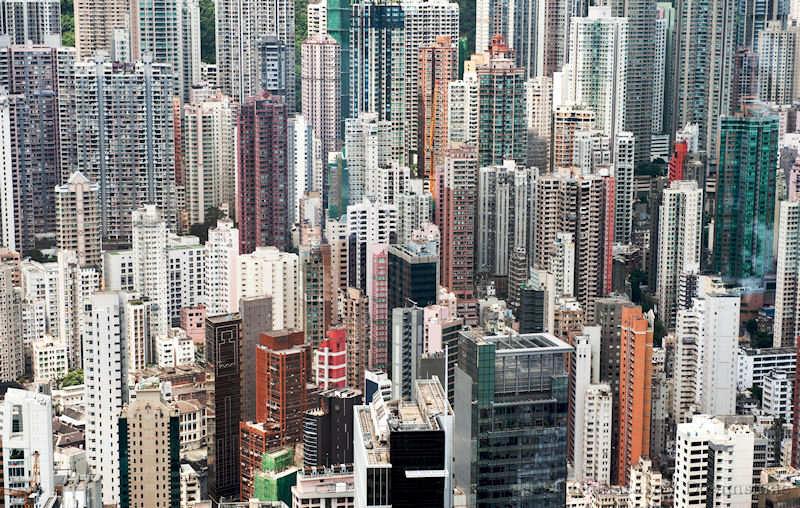
Financial and industrial enterprises have flourished and Hong Kong remains a city of world-wide importance. It became Britain's richest colony. HSBC ➚ (Hong Kong and Shanghai bank) and Bank of China ➚ have impressive skyscraper buildings here. By many measures it is the most densely populated city ➚ on Earth. Hong Kong has a notable local film industry which produced massively successful ‘Kung fu’ films. The success of Hong Kong made it the template for how to develop cities on mainland China. Famous for cuisine and a major luxury shopping area, it remains a popular tourist destination. Life is frenetic and never seems to stop.
The people who have come to Hong Kong have been diverse, it is not a homogenous population. There are a good number from neighboring Guangzhou who were the first to move there but there are sizable groups such as the Hakka and Teochew People ➚ with their own customs and dialect.
The boats of the Star Ferry company ➚ provide excellent views of the city from the water as they navigate the narrow stretch between Hong Kong island and Kowloon. The Zoological and Botanical Gardens ➚ are world famous for their impressive collections of animals and plants. The Tin Hau Temple ➚ in Causeway Bay is a relatively modern temple from the Qing dynasty while Victoria Peak is a mountainous viewpoint which offers dramatic views of the skyline. Each day the noon day gun is fired as it has done since the 1864. It is immortalized in Noel Coward’s ‘Mad dogs and Englishman ➚’ song. The tradition started because the British trading company of Jardines ➚ had had the habit of firing a gun salute whenever a senior executive arrived, while this privilege should have been reserved for only military commanders. As punishment Jardines were ordered to fire a noon day gun for ever after. Horse racing is a very popular sport, and the Happy Valley Racecourse ➚ in the center of the city has packed stands on Wednesday nights.
Hong Kong's six universities are highly rated internationally and they represent an important function of the territory before western style universities were established on the mainland. For example Sun Yatsen studied medicine at the University of Hong Kong.
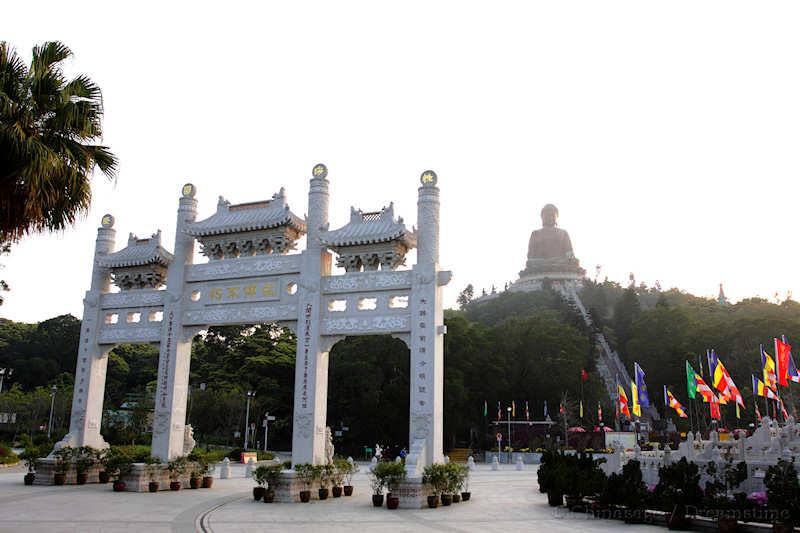
Geography
Hong Kong consists of a group of mountainous islands and a chunk of mainland. The terrain heavily restricts development but there are some surprisingly peaceful and beautiful nature reserves within Hong Kong's boundaries. The climate is extremely hot, wet and humid in summer with winters drier but not that much cooler.
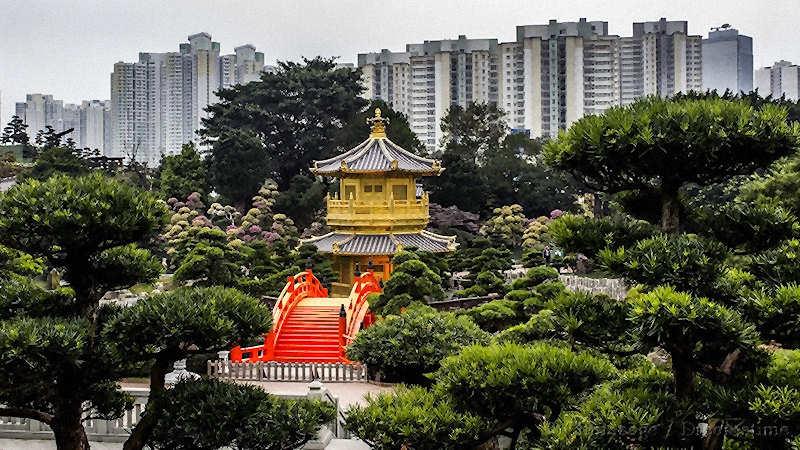
Airports
The airport has 2 terminals and is located 21.7 miles (35.0 kms) from Hong Kong City. Live Flight information ➚, Airport information ➚, rank in China 3
International Links to :Many Countries
See map of location Hong Kong International Airport
Universities
University of Hong Kong 香港大学
After the rapid development of Hong Kong, the original College of Medicine (where Sun Yatsen was the most famous student) became a University in 1911 and has been the highest ranked Chinese University for some years. It is highly regarded in a number of disciplines including law and medicine.. Undergraduates: 15227, Postgraduates: 11778, International students: 6814, GP World ranking 32Hong Kong University of Science and Technology 香港科技大学
The Hong Kong University of Science and Technology often abbreviated as HKUST was founded less than 35 years ago; it specializes in science, engineering, business and technology and has rapidly achieved a high International ranking.. Undergraduates: 8699, Postgraduates: 3897, International students: 3625, GP World ranking 28Chinese University of Hong Kong 香港中文大学
Despite the use of 'Chinese' in its name, English is the main teaching language at this well regarded Hong Kong University just 50 years old. It has a high international reputation in mathematics; science; medicine as well as the arts and humanities.. Undergraduates: 15351, Postgraduates: 13337, International students: 2746, GP World ranking 51City University of Hong Kong 香港城市大学
Hong Kong has more than its fair share of prestigious universities and the City University is among the top six academic institutions in the territory. It became a full University in 1994 and teaches all the main subjects to a high level. It ranks high in languages and linguistics. Like other Hong Kong universities it teaches principally in English.. Undergraduates: 12689, Postgraduates: 6017, International students: 905, GP World ranking 57Hong Kong Polytechnic University 香港理工大学
This old Hong Kong institution became a University in 1994. It is now the third ranked university in Hong Kong with a high international reputation. It concentrates on business, design, engineering rather than science.. Undergraduates: 18777, Postgraduates: 8766, International students: 481, GP World ranking 116Hong Kong Baptist University 香港浸会大学
Originally founded as an American Baptist College it became a university in 1994 and now has a high international ranking. It has a full range of courses and is strong in geography, computer science and mathematics.. Undergraduates: 6690, Postgraduates: 2601, International students: 2720, GP World ranking 281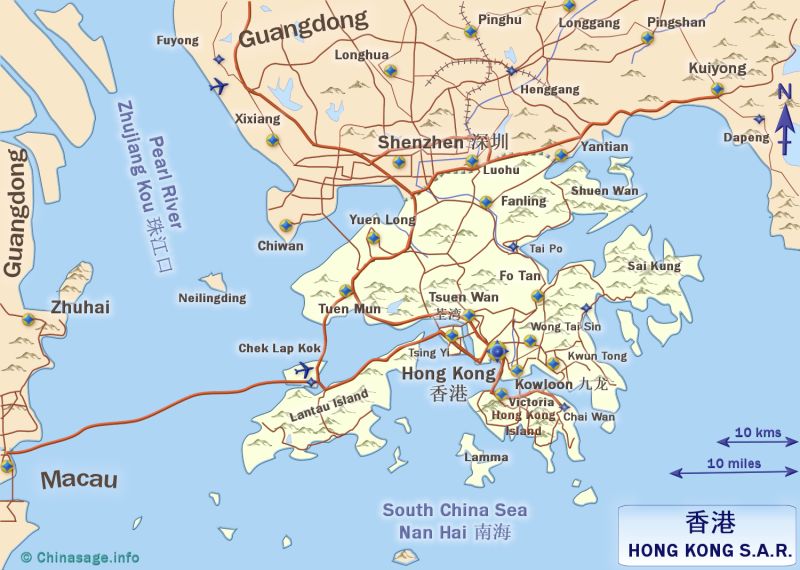
Google map of Hong Kong
Bing map of Hong Kong ➚
Show Bing Map ➚
Hong Kong Climate
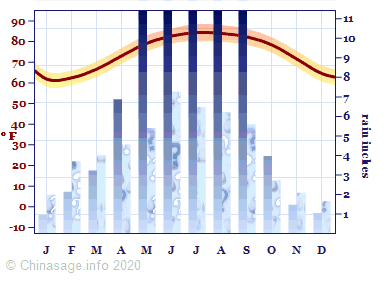
| Major Cities | Population | |
|---|---|---|
| Hong Kong City | 香港 | 7,404,886 |
Book: A Map History of Modern China: Catchpole: Heinemann: 1976 p. 22
Book: China : Eyewitness Travel: Dorling Kindersley: 2012 pp. 307-325
Book: China A to Z: May-lee Chai and Winberg Chai: Plume: 2007 pp. 137-139
Book: Encounters with China: Trea Wiltshire: Formasia Books: 1995 pp. 168-173
Book: Lonely Planet: China: 1988 pp. 162-164
Book: Modern China: A companion to a rising power: Graham Hutchings:… pp. 202-204
Book: Mr. China: Tim Clissold: Harper Business: 2004 p. 8
Book: Nagel's Encyclopedia guide: China: Nagel: 1978 pp. 1195-1202
Book: The Fragrant Chinese: Anthony Lawrence: Chinese University Press: 1993 pp. 1-233
Web page: Hong Kong (teacup) ➚
Web page: Hong Kong (wikitravel) ➚
Web page: Hong Kong Travel: Hong Kong Disneyland Travel ➚
City populations for 2012, Province statistics National Bureau of Statistics 2014